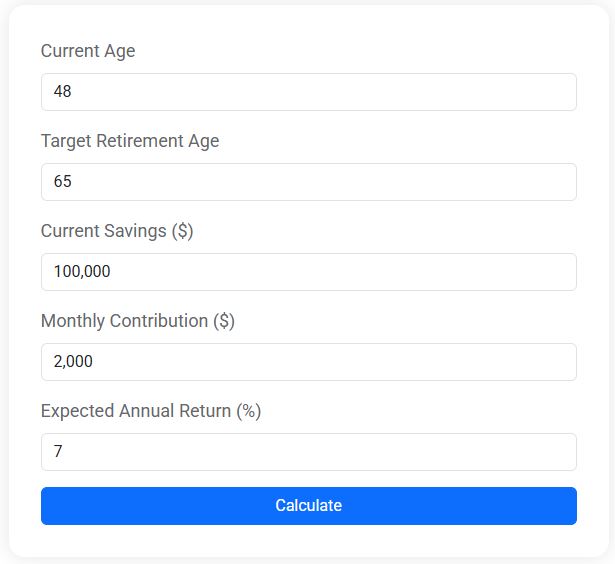You Have $1.2 Million and You're 55 — How Long Will It Last in Retirement?

Retirement planning with $1.2 million at age 55 is a strong start, but its longevity depends on factors like lifestyle choices, inflation, and market conditions. Understanding and managing retirement expenses, utilizing the 4% rule for withdrawals, and integrating Social Security and other income streams are crucial steps. Additionally, preparing for healthcare costs and adjusting for inflation and market volatility are essential for ensuring your savings last throughout retirement.
Retirement is a phase many look forward to, dreaming of leisurely mornings, travel, and chasing long-held passions. But with the average life expectancy climbing, the question on everyone's mind is: how long will my savings last? If you're 55 with $1.2 million tucked away, congratulations — you've got a solid head start. However, the longevity of that nest egg depends on a myriad of factors. Let’s dive into the key elements that will determine just how far your savings will stretch.
Understanding Your Retirement Expenses
Before we can predict how long your $1.2 million will last, it's crucial to get a handle on your expected retirement expenses. These aren't just numbers on a spreadsheet; they’re the real-world costs of your lifestyle choices. Are you planning to downsize your home or move to a state with no income tax? Do you have dreams of traveling the world, or are you more of a homebody with modest tastes?
For example, a couple living in a modest suburban area will likely have different financial needs compared to someone planning to retire in an urban setting with a higher cost of living. According to the Bureau of Labor Statistics, the average U.S. retiree household spends about $50,000 annually. However, costs can vary widely based on personal lifestyle. By analyzing your current spending and adjusting for planned lifestyle changes, you can create a more accurate picture of your future financial needs.
The 4% Rule: A Guideline, Not a Guarantee
The 4% rule has long been a staple in retirement planning discussions. Originating from a study by financial advisor William Bengen in the 1990s, the rule suggests that if you withdraw 4% of your retirement savings annually, adjusted for inflation, your money should last for 30 years. For someone with $1.2 million, this translates to about $48,000 a year. But the key word here is "should," because like any rule, it comes with caveats.
Market conditions, inflation rates, and unexpected expenses can all throw a wrench in this plan. For instance, the sequence of returns risk — the danger of experiencing poor market returns early in retirement — can deplete savings faster than anticipated. As financial advisor Jane Smith points out, “The 4% rule is a starting point. It's vital to stay flexible and adjust withdrawals based on market conditions and personal needs.”
Early Retirement Calculator
Thinking about retiring early? Our free Early Retirement Calculator helps you figure out exactly how much you need to save and invest to reach financial freedom sooner. Whether you're aiming for early retirement at 55, 50, or even 40, this tool gives you a personalized projection based on your current savings, monthly contributions, and expected return on investment. Start planning your path to financial independence today.
Integrating Social Security and Other Income Streams
Social Security is an essential component of many retirees' financial plans, but when to start collecting benefits can significantly impact your overall retirement strategy. The longer you wait to start collecting — up to age 70 — the larger your monthly benefit will be. For someone retiring at 55, this could mean relying solely on savings for several years.
Apart from Social Security, consider other potential income streams, such as pensions, rental income, or part-time work. Diversifying your income sources can ease the burden on your savings. For instance, if you’re passionate about gardening, perhaps you can turn that hobby into a small business. Not only does this provide extra income, but it also keeps you engaged and active.
Preparing for Healthcare Costs
Healthcare is one of the most unpredictable and significant expenses in retirement. According to Fidelity, a 65-year-old couple retiring today can expect to spend around $300,000 on healthcare throughout retirement. If you're retiring at 55, you’ll need to bridge the gap to Medicare eligibility at 65, possibly through private insurance, which can be costly.
Consider investing in a Health Savings Account (HSA) if you're still eligible, as it offers tax advantages and can be a strategic way to save for future medical expenses. Additionally, researching Medigap policies or long-term care insurance can provide added peace of mind, ensuring you're covered for more significant health issues without draining your savings.
Adjusting for Inflation and Market Volatility
Inflation is the silent adversary of retirees, slowly eroding purchasing power over time. Even a modest inflation rate of 2-3% can significantly impact your expenses over a 20 or 30-year retirement period. To combat this, it's essential to keep a portion of your portfolio invested in growth-oriented assets, such as stocks, which historically outpace inflation.
Market volatility, on the other hand, can be nerve-wracking, especially when you're no longer bringing in a regular paycheck. Diversification remains your best friend here. By spreading investments across various asset classes, you can buffer against downturns. As CNBC notes, maintaining a balanced portfolio that adjusts over time with your risk tolerance and financial needs is crucial.
Staying Flexible and Reviewing Regularly
Retirement planning is not a set-it-and-forget-it process. Regularly reviewing and adjusting your plan is essential. Life changes, and so do your financial needs. Perhaps you're spending less than anticipated, or maybe unexpected expenses have arisen.
Keeping a close eye on your finances allows you to make informed decisions about your withdrawal rates, investment strategies, and lifestyle choices. As financial landscapes shift, what worked yesterday might not be the best course today. Regular check-ins, whether independently or with a trusted financial advisor, can help ensure that your $1.2 million lasts as long as you need it to.
Retirement is a journey, not a destination. With thoughtful planning, flexibility, and a bit of vigilance, your hard-earned savings can support the life you've envisioned. After all, retirement should be about enjoying the fruits of your labor, not fretting over finances. Here's to a future that's not just secure but fulfilling.








